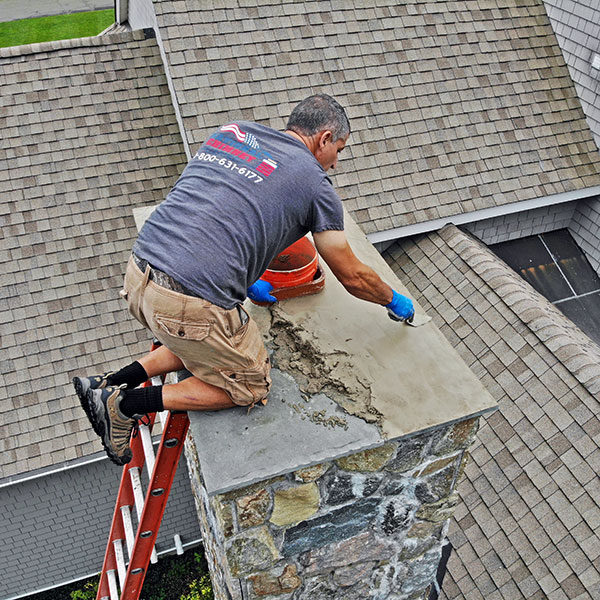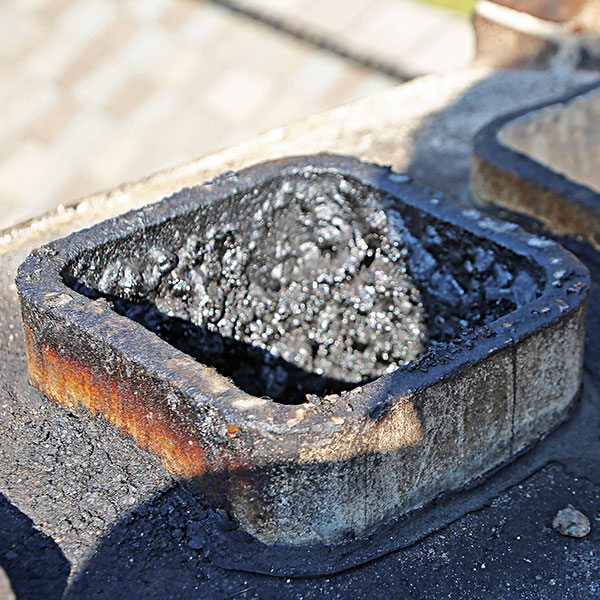Is Your Chimney in Trouble?
Early signs of chimney trouble aren’t always obvious, but you can spot many of them if you know what to look for. Catching chimney damage and malfunction early is the key to preventing major repair work down the line and ensuring that your chimney/fireplace system runs safely and efficiently.
Watch for these four warning signs.
 Damage to chimney & fireplace components
Damage to chimney & fireplace components
For a chimney and fireplace to run safely, all its components need to be in good shape. In between inspections, periodically check the following components:
- Chimney flashing that protects the gap between your exterior chimney and roof
- Chimney cap that sits on top of the chimney to keep water out of the flue and away from the crown
- Chimney crown, the concrete structure that covers the entire top of the chimney minus the flue opening
- Fireplace damper, which directs smoke needs to be able to open and close fully
Damaged chimney and fireplace components can sometimes be repaired. In severe cases, they can be replaced. The earlier you discover an issue, the more likely you are to remedy it before destruction occurs.
Chimney leaks
Chimneys can leak for many reasons. No matter the cause or the location of the leak, a leaky chimney can lead to serious damage to the chimney structure, its components and adjacent materials of your home.
An annual chimney inspection is always recommended to spot early signs of chimney leaks and other damage. In the meantime, you can watch for:
- White staining on exterior masonry (means water is penetrating the bricks)
- Rusting on any metal component within the chimney system (including the fireplace damper)
- Water in the firebox
- Damp areas on the ceiling or walls near the chimney/fireplace
- Strong musty smells coming from the firebox
Masonry damage
Cracked or loose bricks and crumbling mortar in your chimney’s masonry is a sure sign that there’s a problem. This is not something you want to ignore.
Compromises to the masonry of a chimney can allow water to seep in and begin a cycle of deterioration and decay. Extensive brick damage and failing mortar can lead to a chimney that leans to one side or eventually collapses entirely.
Report any masonry damage you spot to your local chimney services provider and let them resolve the problem.
 Smoke backups
Smoke backups
If you’re experiencing smoke backing up into your home, you might have a very minor problem or a fairly major one.
Smoke backups mean that for some reason smoke from your fireplace isn’t able to get up into and out of your chimney. Causes could include:
Excess creosote buildups in the flue
Creosote is dangerous as it can block smoke and can also ignite into a chimney fire.
Debris in the flue
This could be leaves and twigs from nearby trees as well as the nests of small animals (solve this problem by installing a proper chimney cap).
House is too air-tight
Air-tight homes disallow enough air to draft fireplace smoke. Try cracking a nearby window.
Negative air pressure
If you’re running a stove fan, bathroom fan, clothes dryer or other blowing devices, this may be keeping air from getting into your fireplace.
Flue is too narrow
If backups are an ongoing problem, it may be that your flue or chimney liner isn’t the right size for your fireplace. Have this checked out by a professional chimney inspector.
Keep your chimney safe, clean and efficient
National Chimney Service is here to help with all your chimney needs including chimney cleaning, chimney inspection and complete repairs and rebuilding work. We serve all of Morris County, NJ, and Fairfield County, CT.
Speak with a chimney expert today at 800-631-6177.

 Damage to chimney & fireplace components
Damage to chimney & fireplace components Smoke backups
Smoke backups